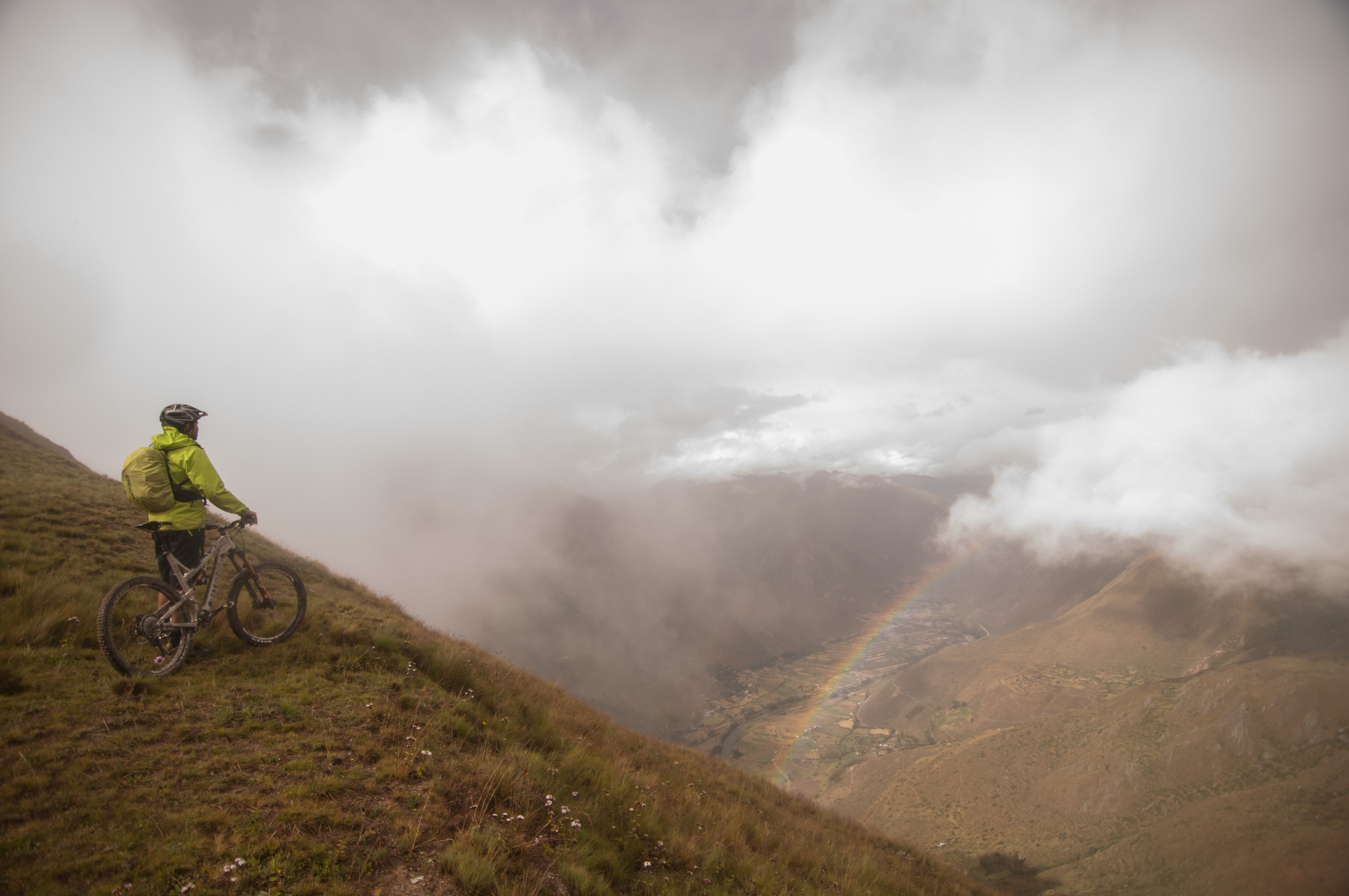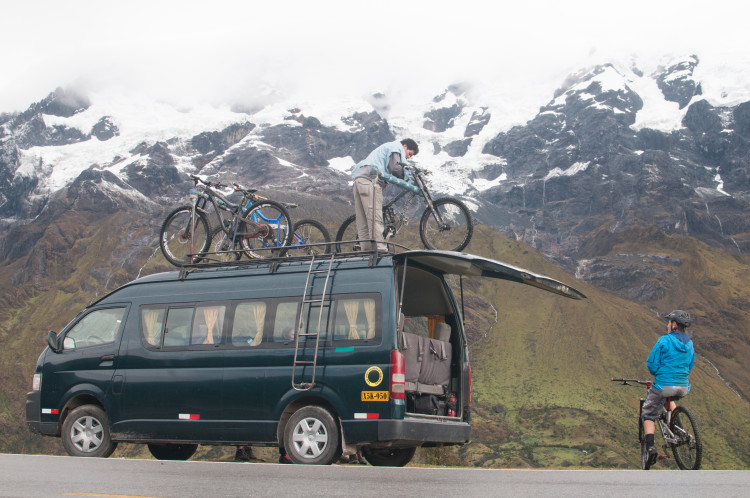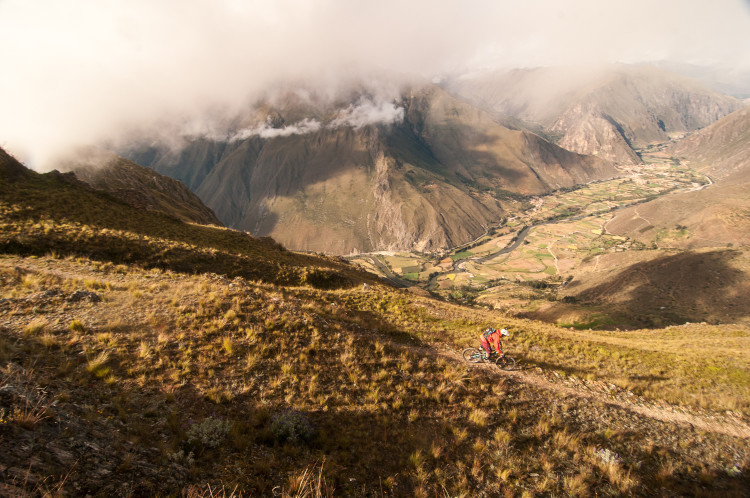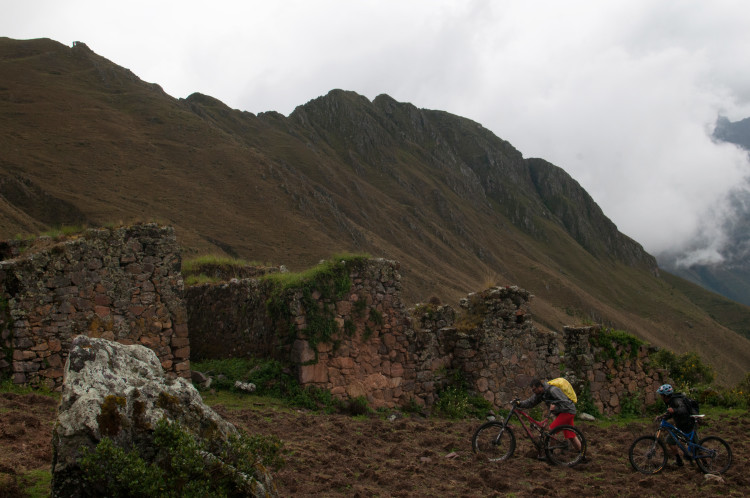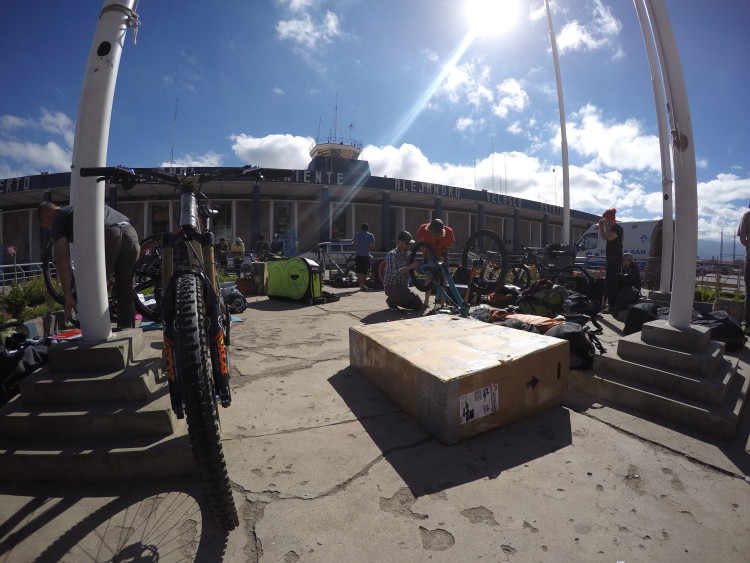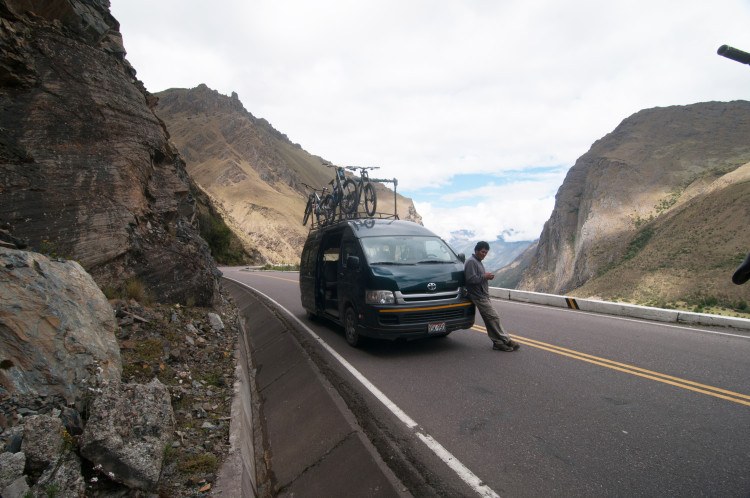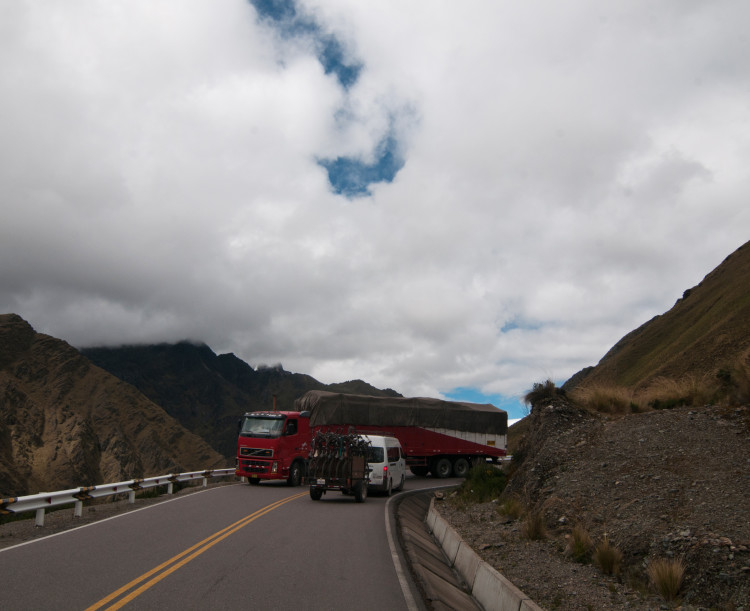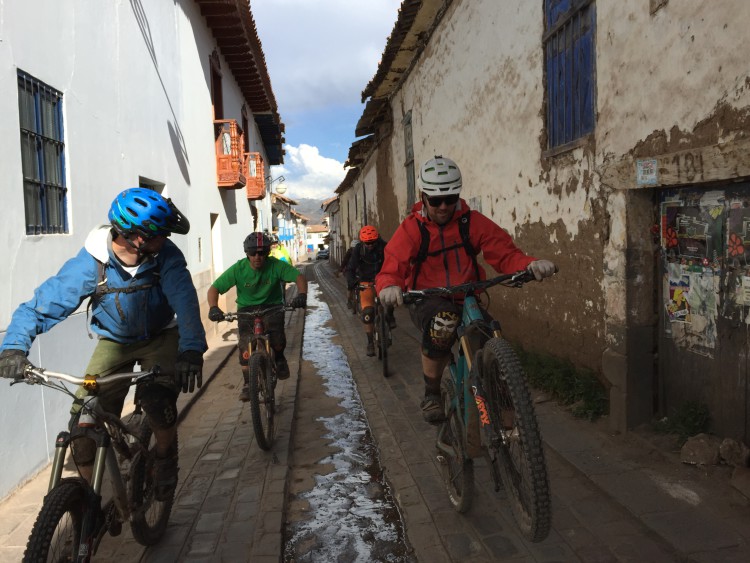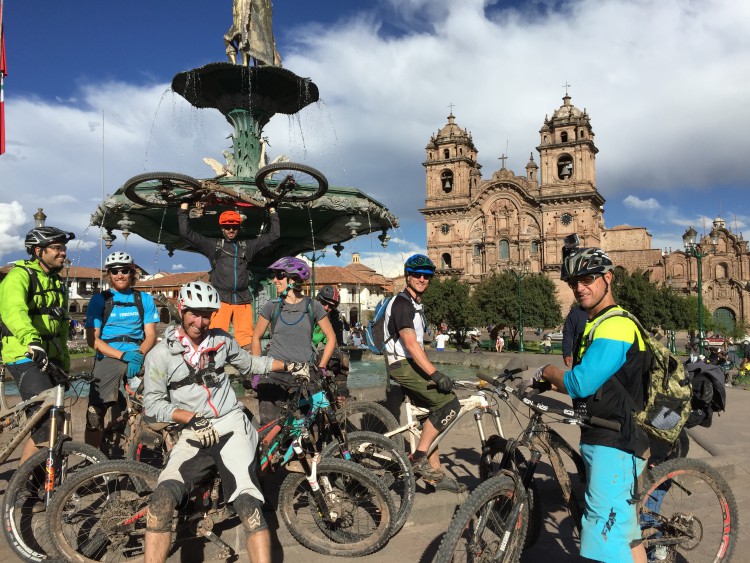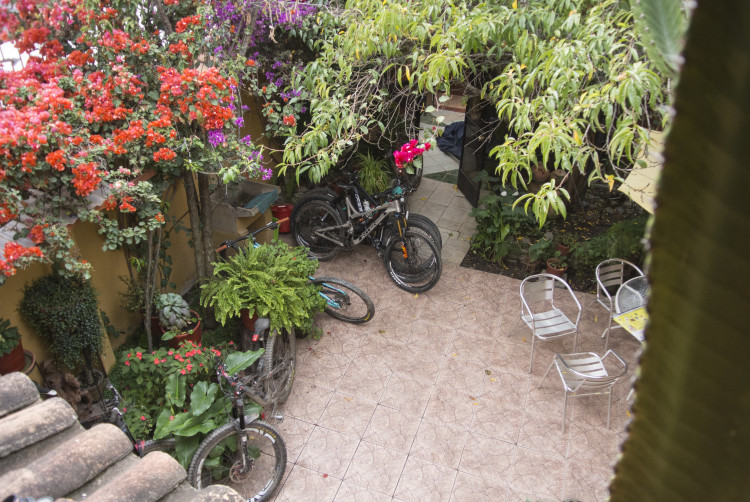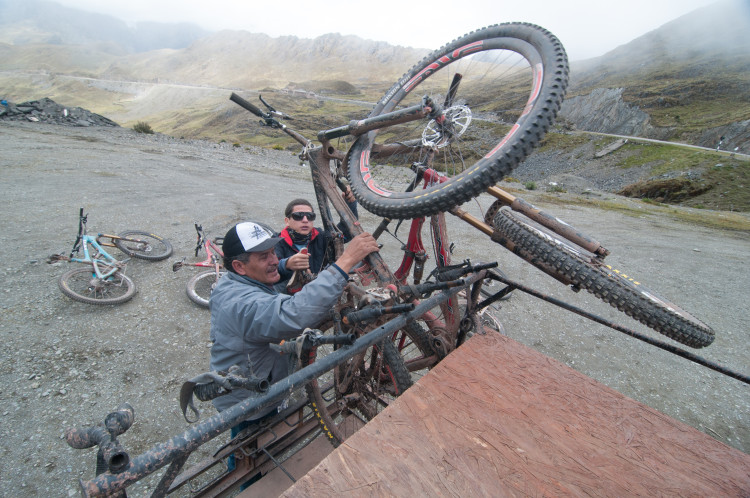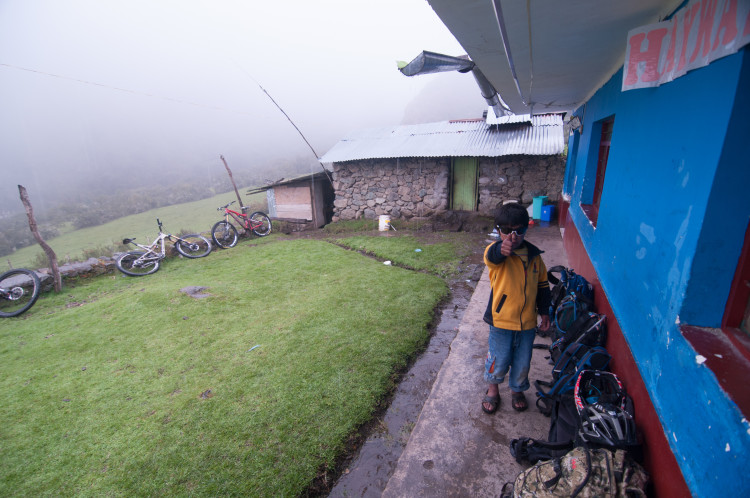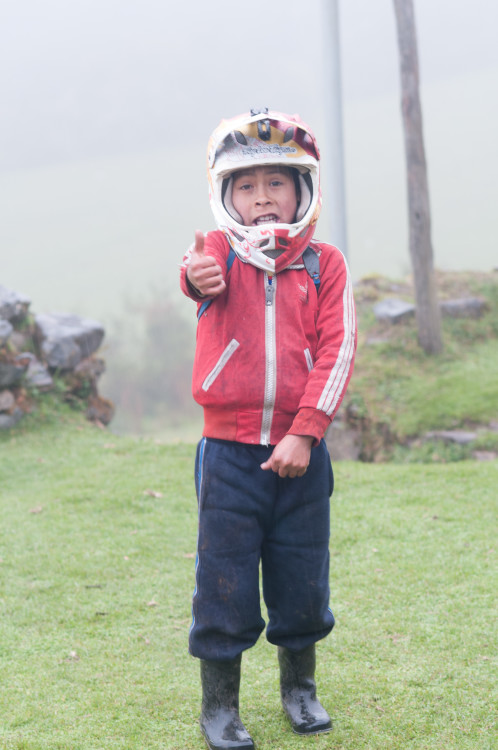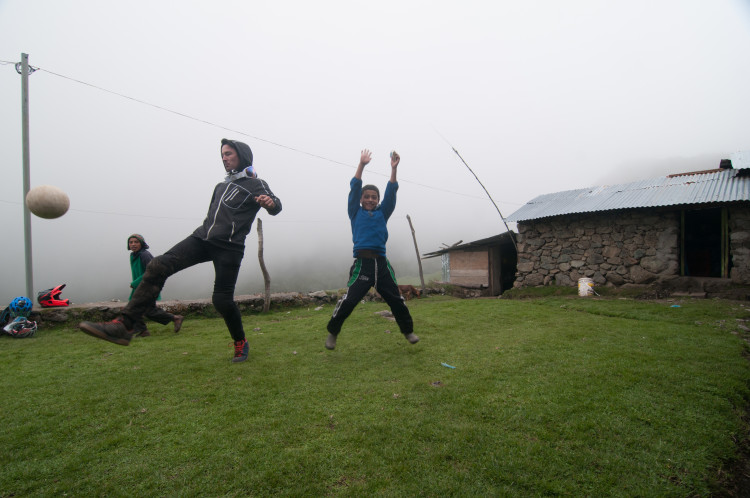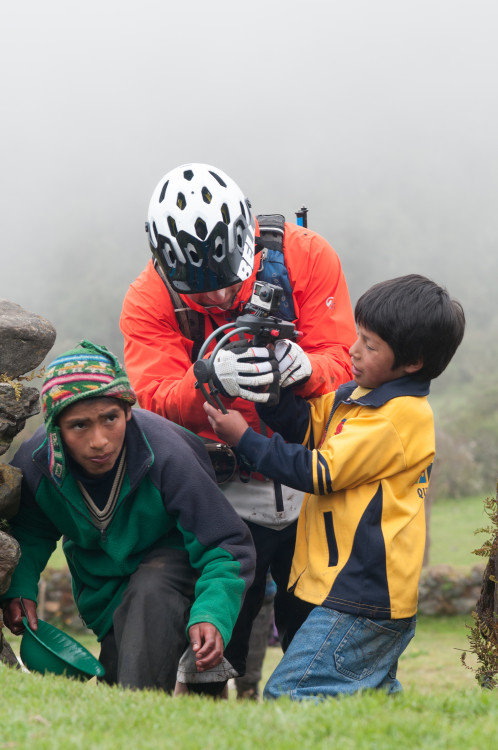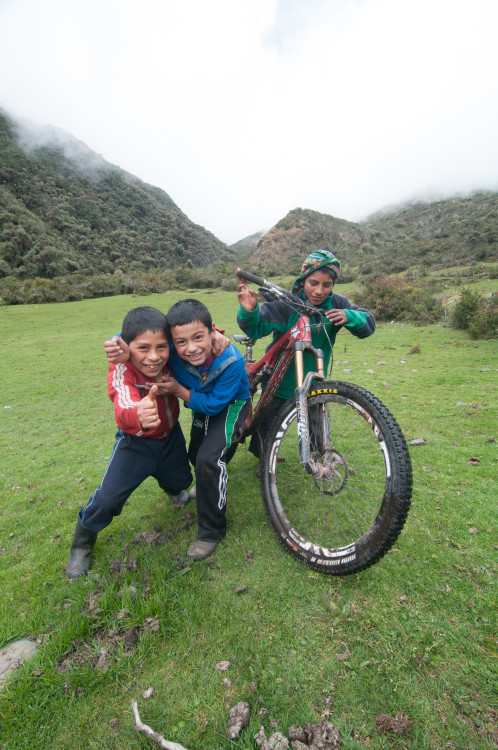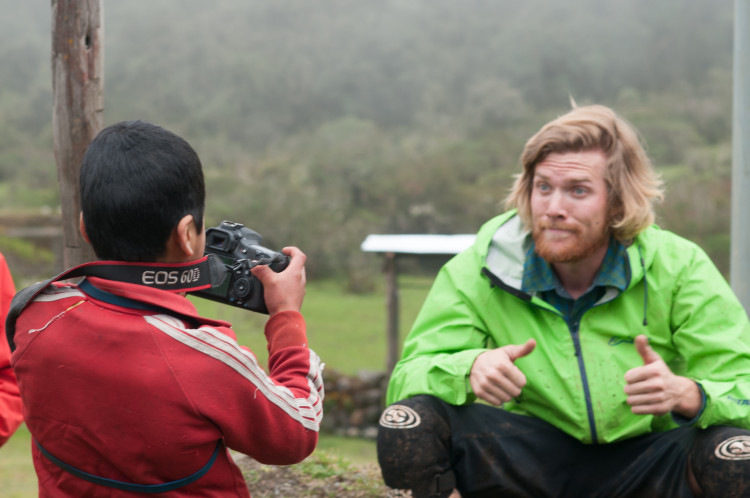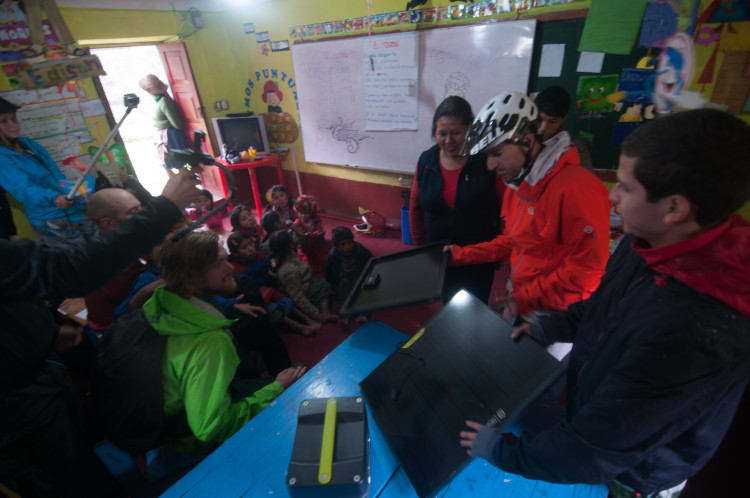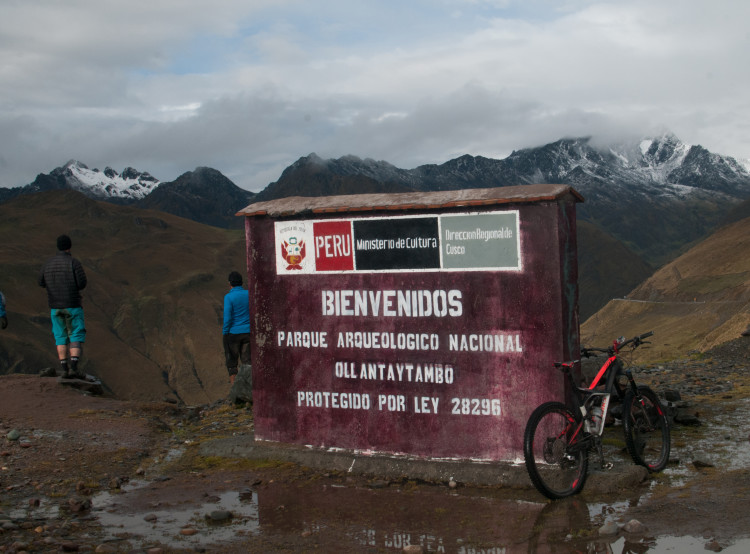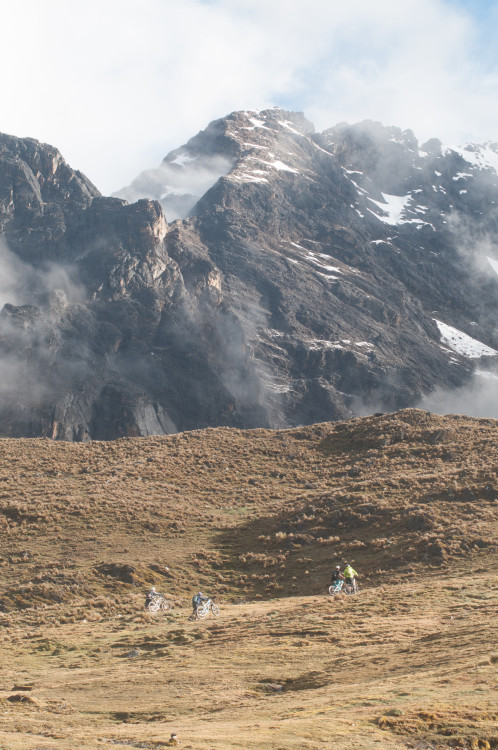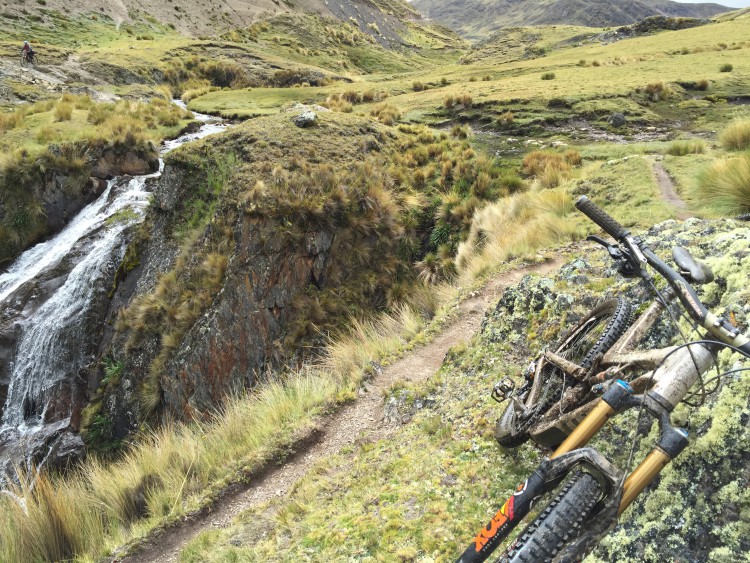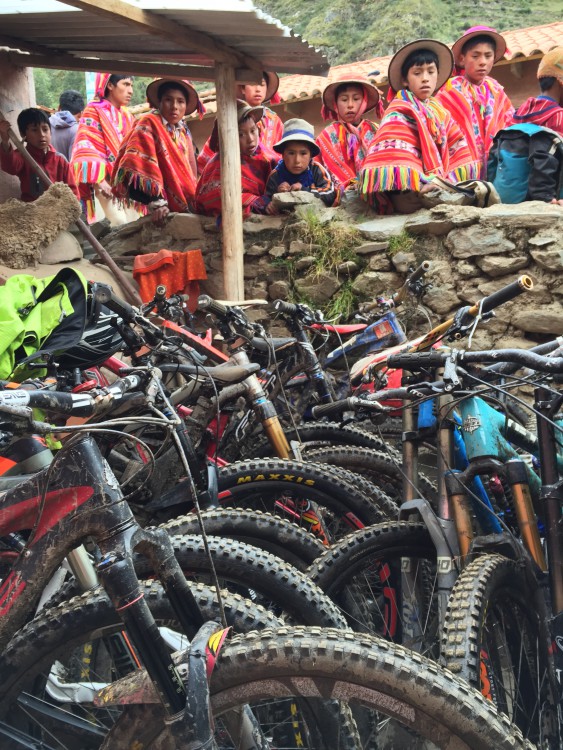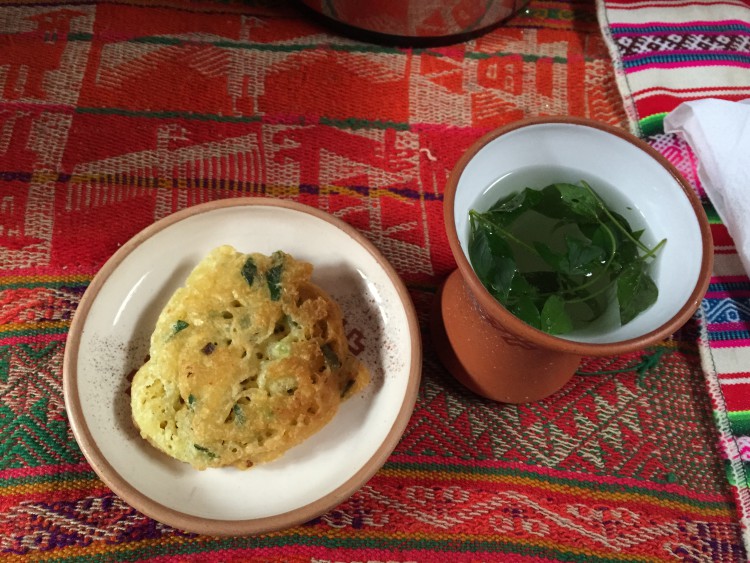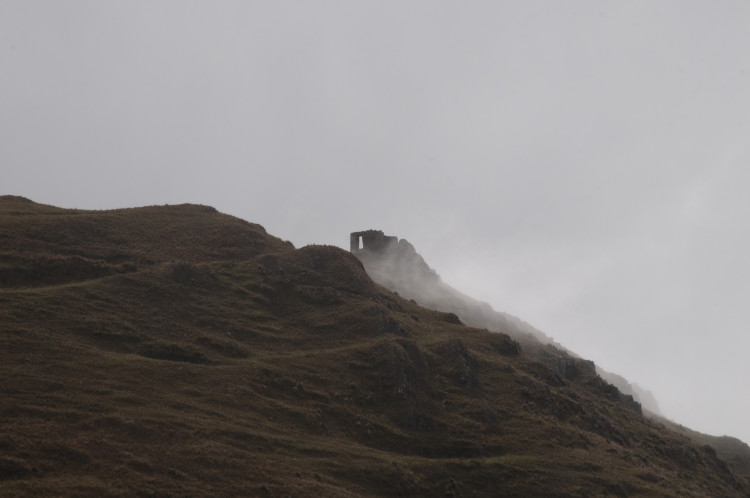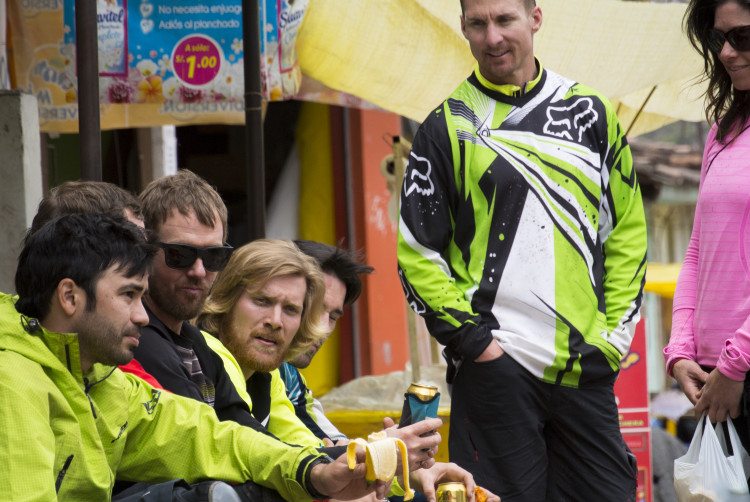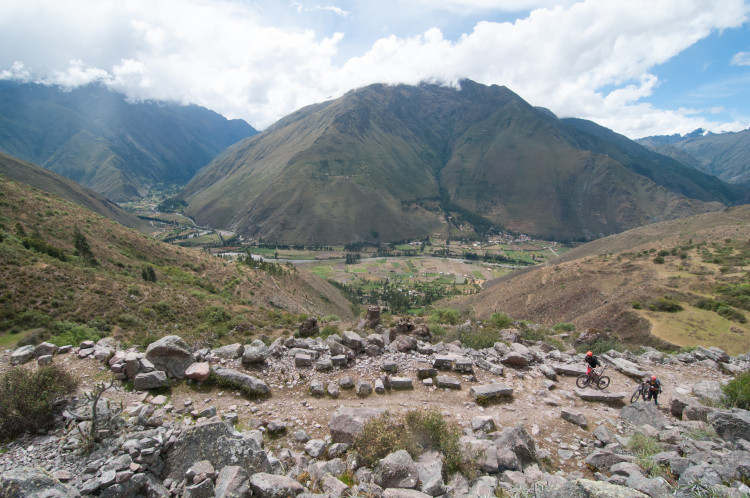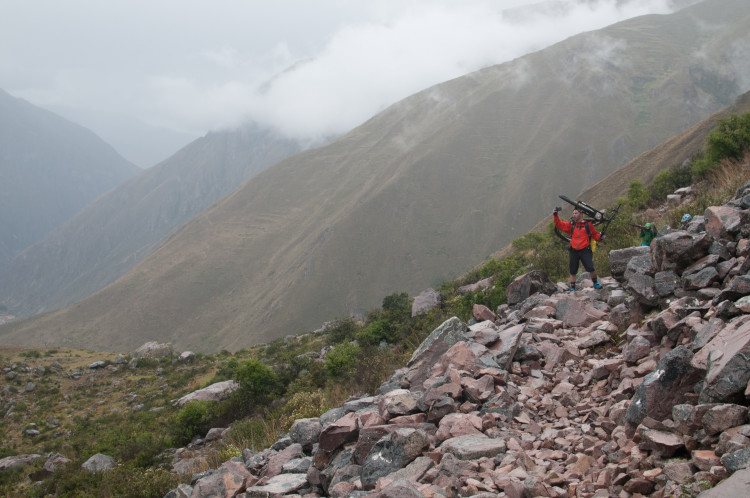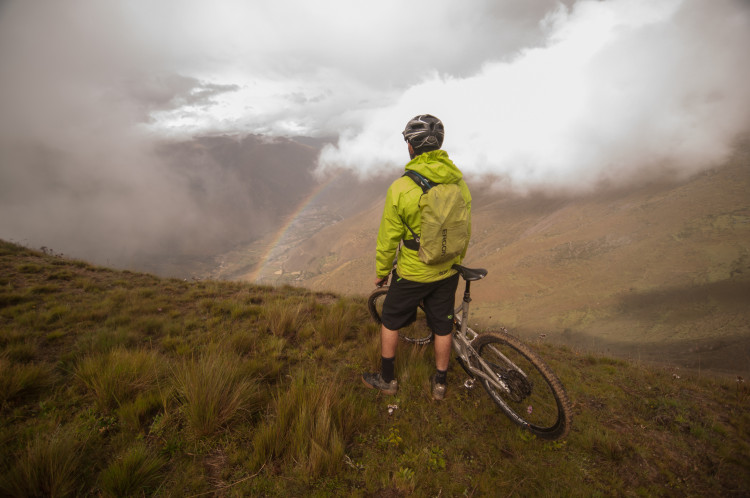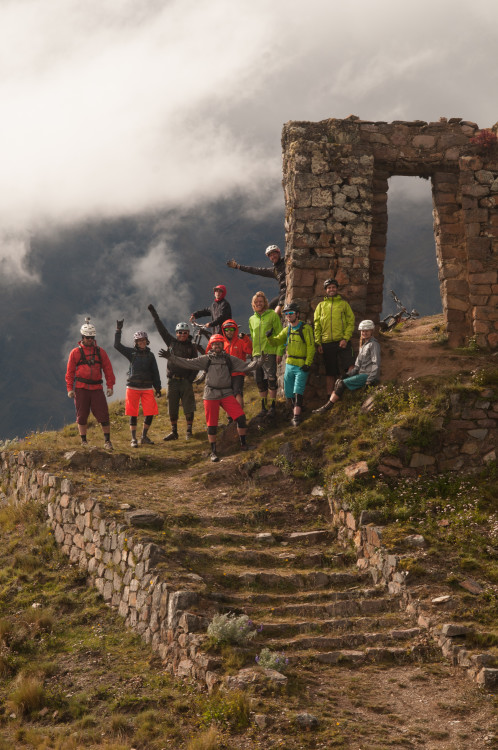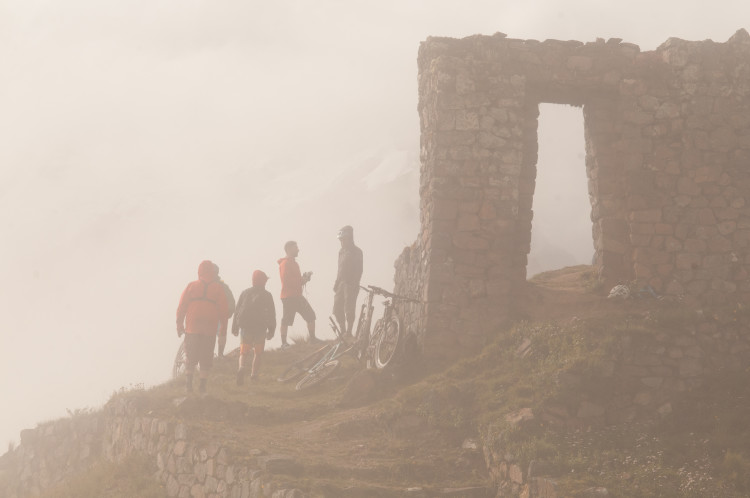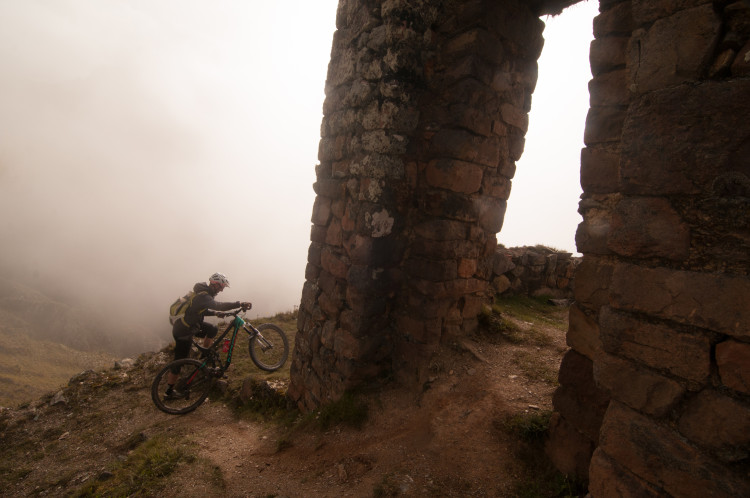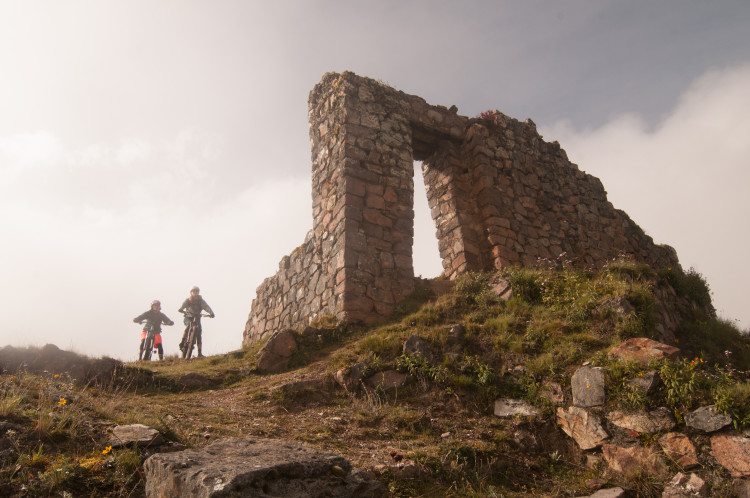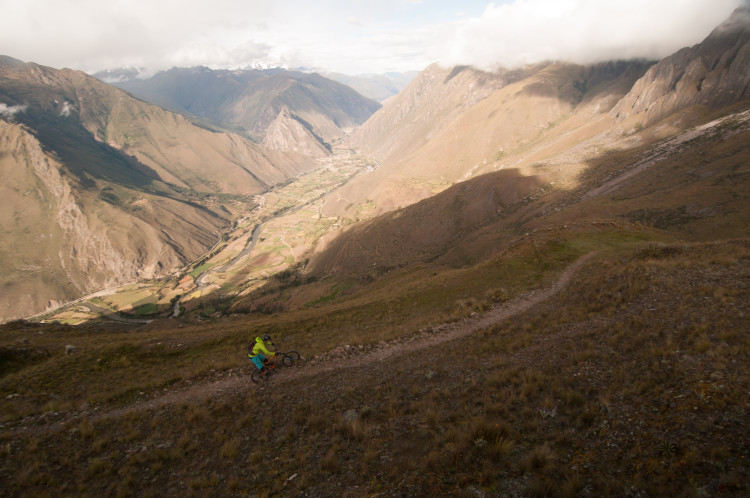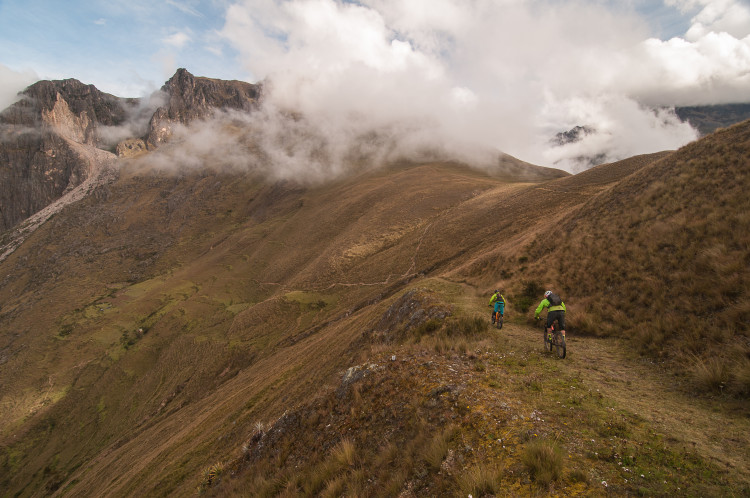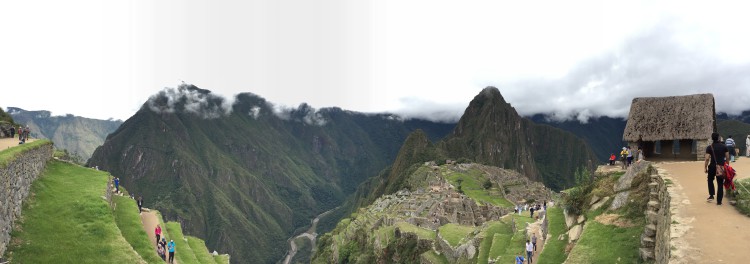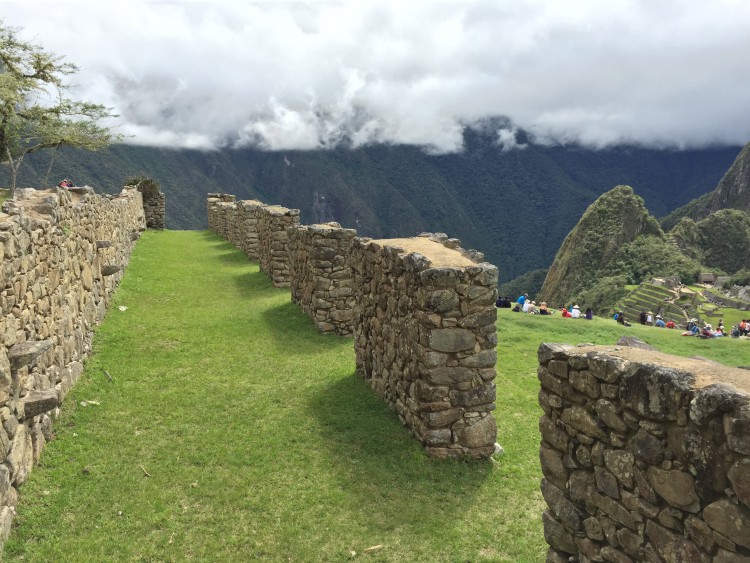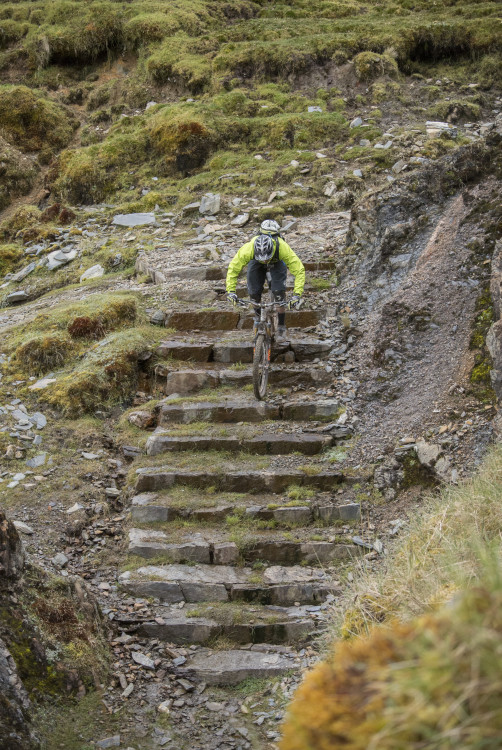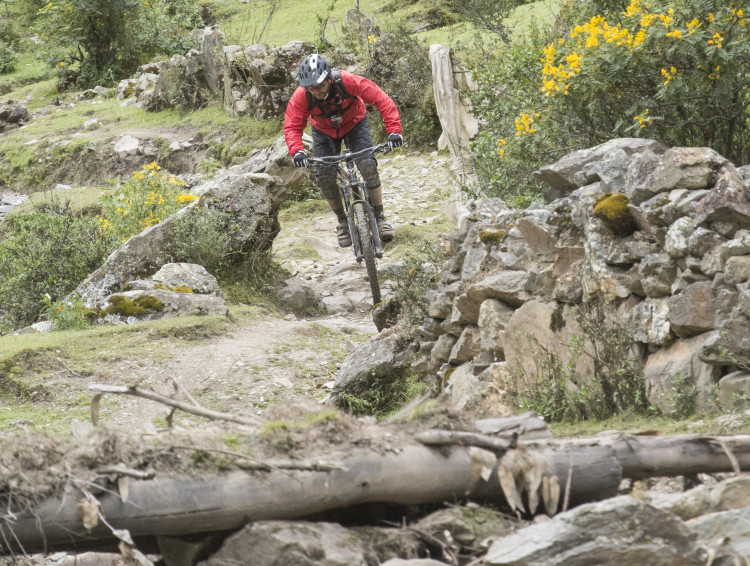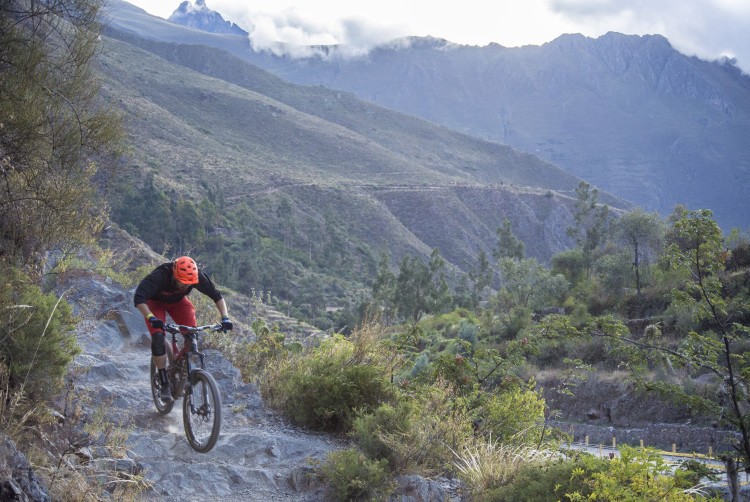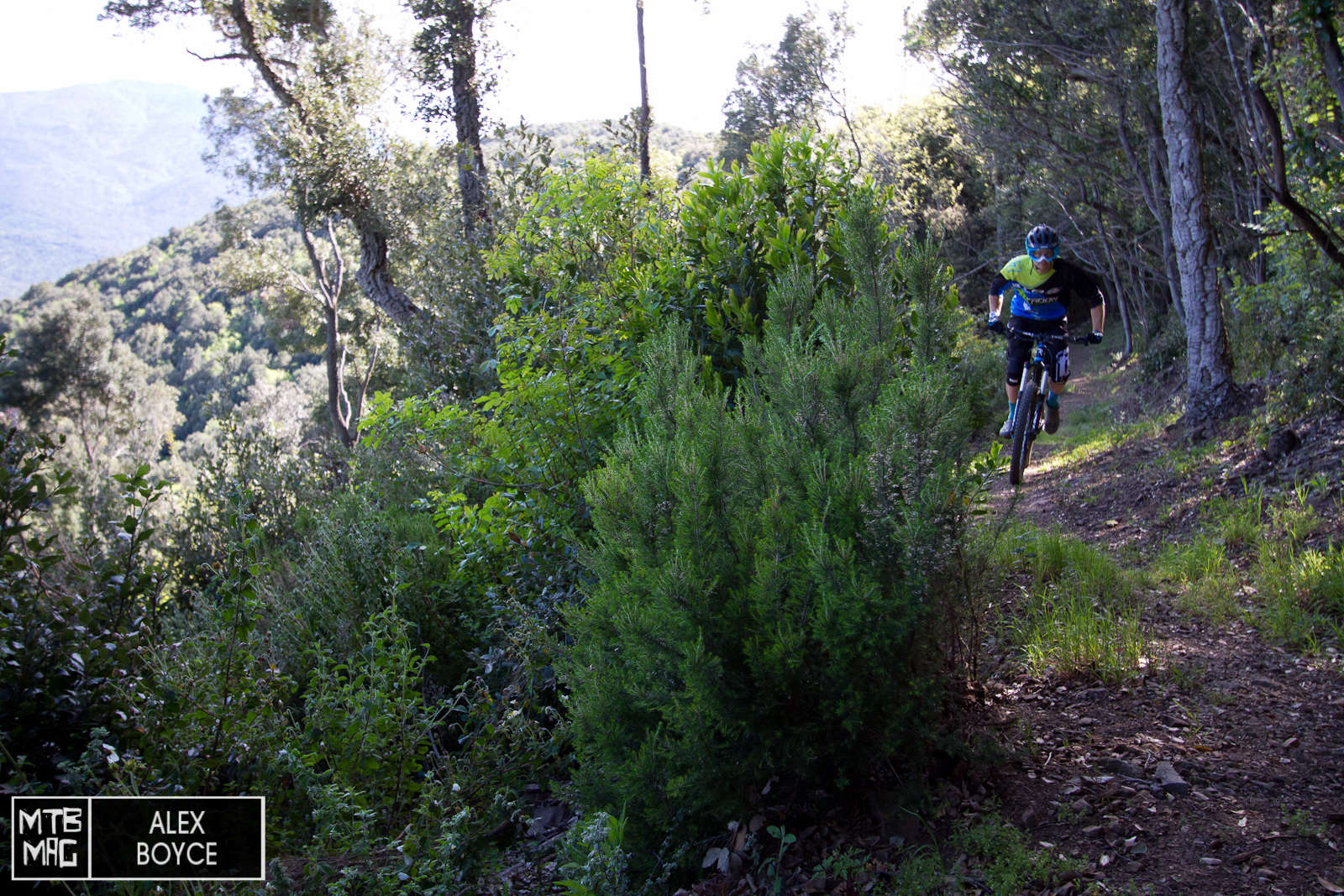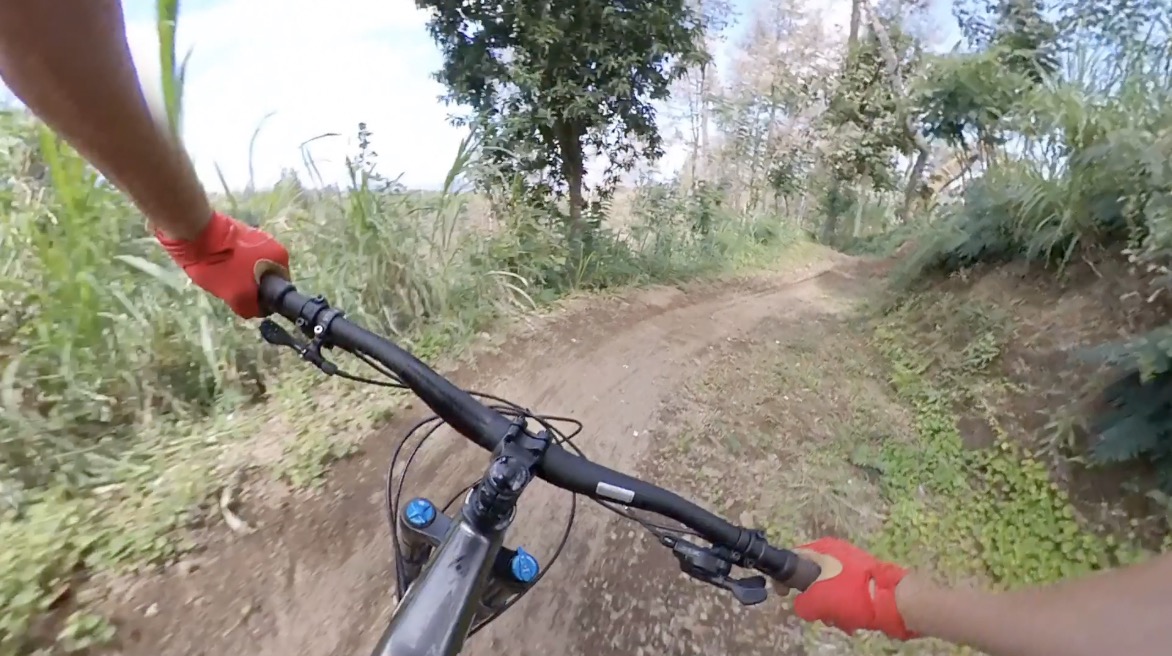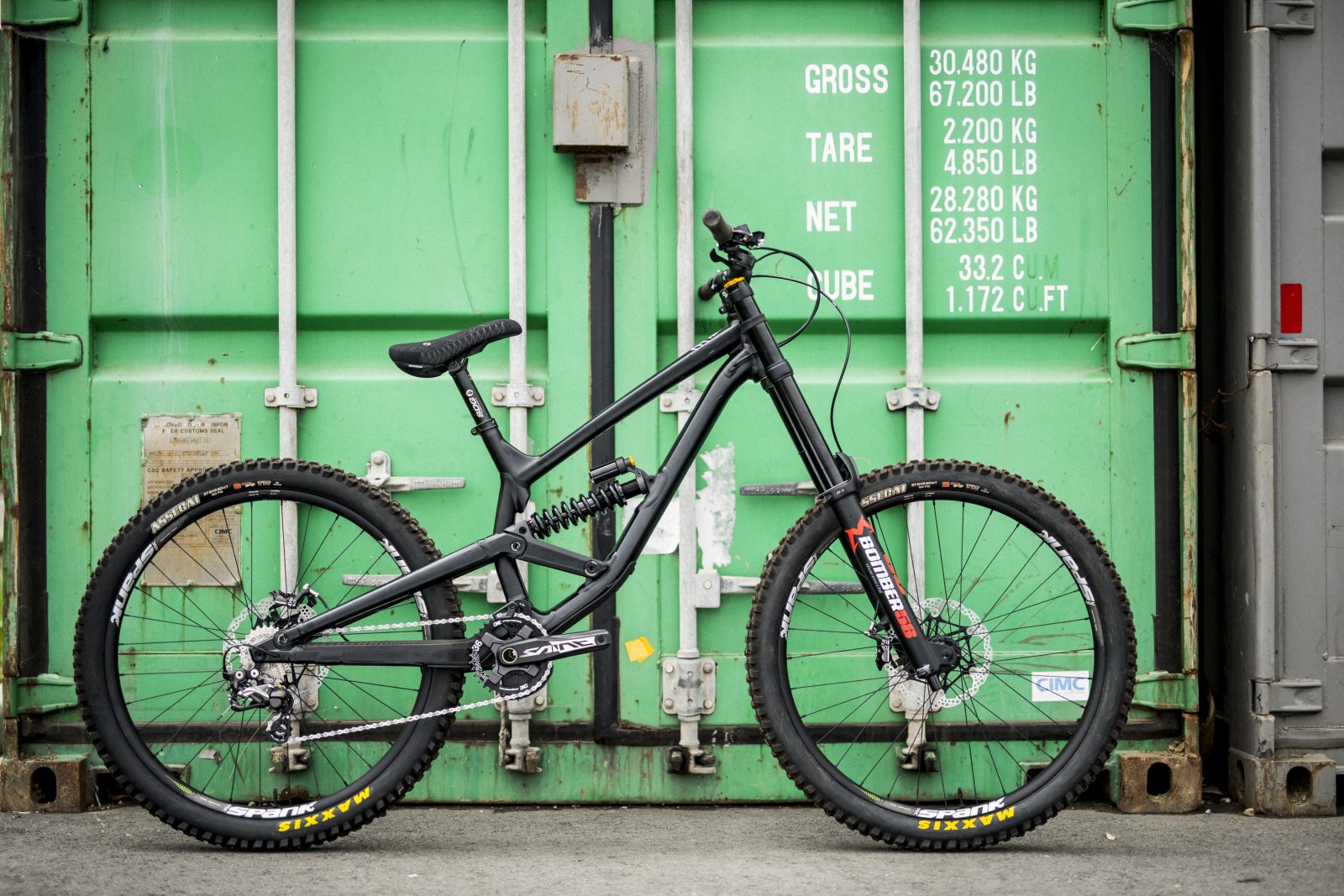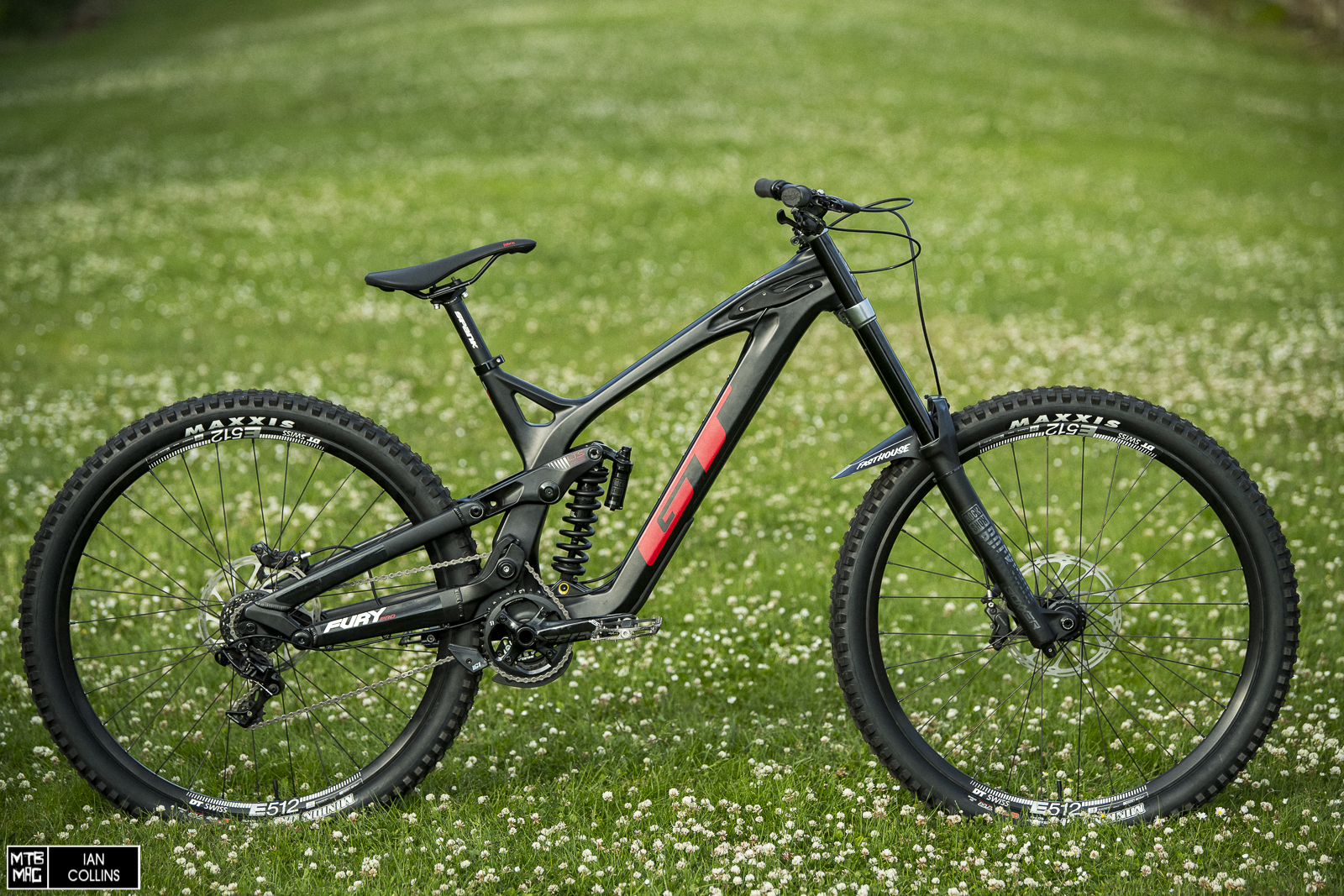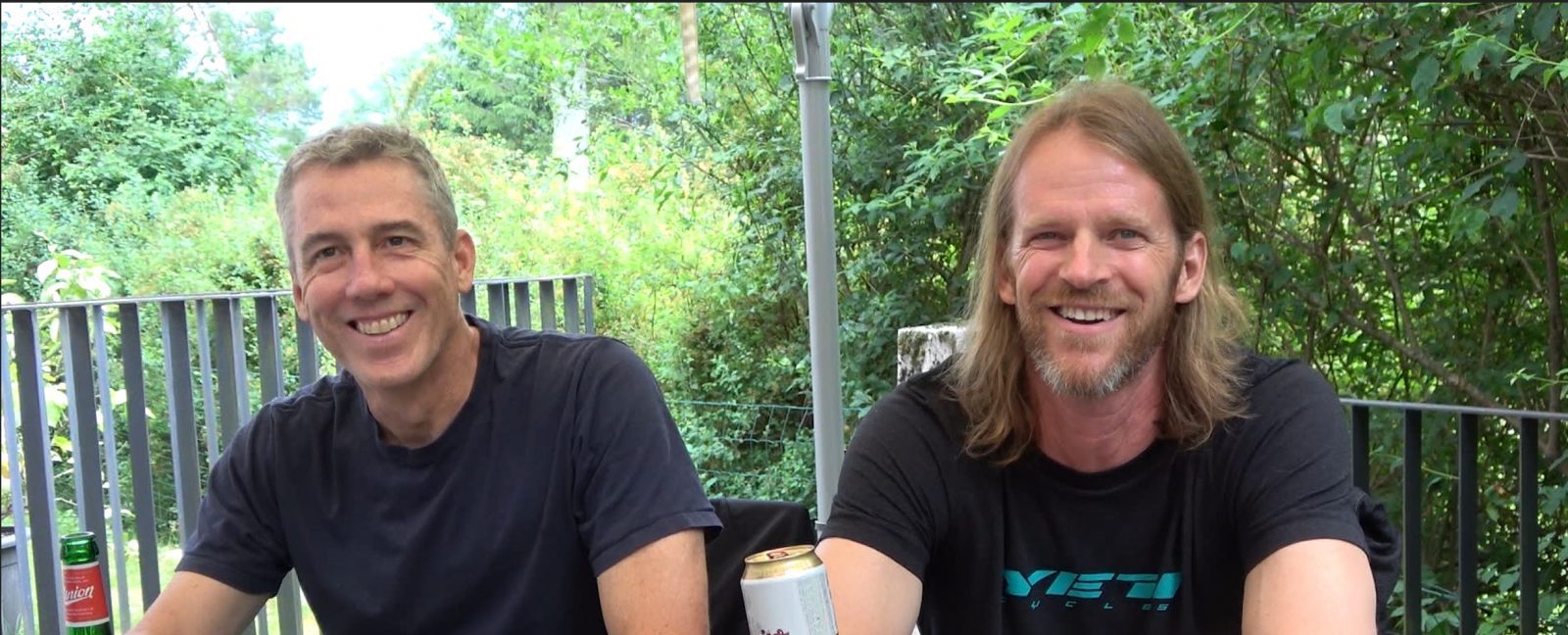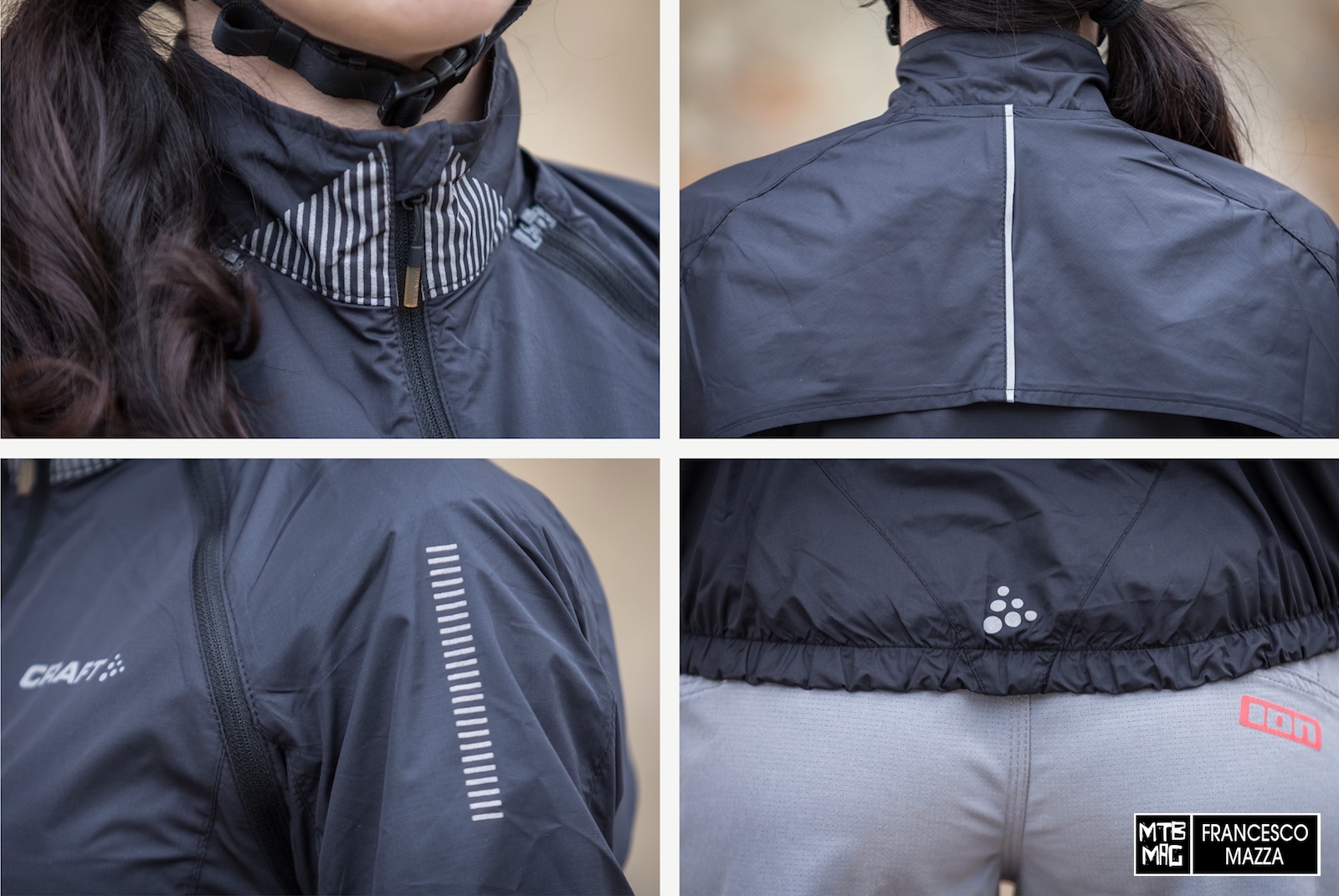The Inca Avalanche Trail Festival; Six days of mountain biking in and around Peru’s Sacred Valley
Text: Alfonso Garcia
Photos: Carlos Diaz (Geo Cusco), Ali Goulet
Luana Olivera waits to get her bike loaded up for another run
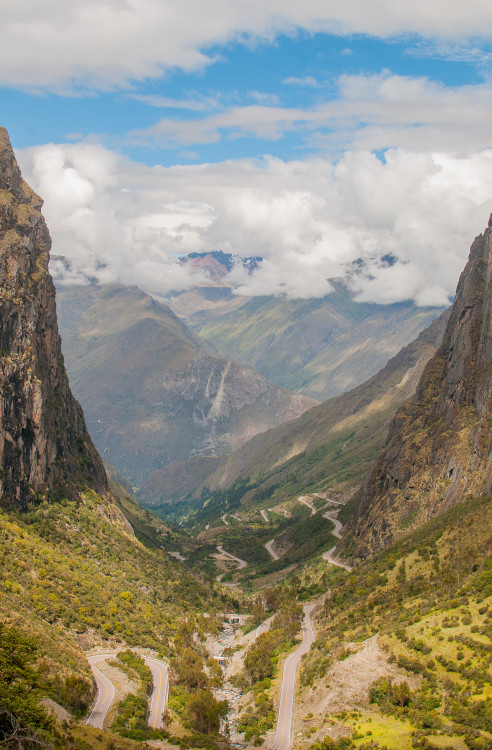
The road up to Abra Malaga
This year the Inca Avalanche Trail Festival took place in early May, deep within the Sacred Valley of the Incas in the Cusco region of the Peruvian Andes. Home base for this epic week of riding was the town of Ollantaytambo, which in ancient times served as an estate for the Incan emperor Pachacuti, who is credited with transforming the Inca kingdom of Cusco into the Inca Empire. The town itself sits at a casual 9,200 feet above sea level and boasts many Incan ruin sites, as well as original Inca structures that are still in use to this day. Massive mountains surround Ollantaytambo in every direction, which give the area a truly inspiring view and feel, even more so when the clouds break and you are able to see the glaciers and jagged peaks that surround the area.
Ollantaytambo and the Sacred Valley of the Inca
Ollantaytambo happens to sit between Cusco and the one of the most famous archeological sites in the world; Machu Picchu. This means that there are bountiful amenities to enjoy such as delicious food and many different hostels to choose from. In addition, this town is one of the last stops for travelers heading to Machu Picchu which makes this a place where many different peoples from all over the world come together, a unique cultural experience in itself! Ollanta as it is often referred to is not a large busy city such as Cusco, and one can expect the internet to be slow and the pace of life much more relaxed, perfect.
Inca ruins
Day 1: Cusco trails
Our first day in Peru started at the Cusco airport; our group for the trail fest included a diverse mix of talented riders from all over the United States, Peru, Canada and Brazil. The “ringleader” for this operation and the group was former pro snowboarder Ali Goulet, and we were also fortunate enough to have local rider “Miky” Miguel Lozano with us. Miky would prove to be a huge help, with his local knowledge and mechanical skills, which kept us all going despite the tremendous challenges that the Peruvian terrain had to offer us.
Cusco airport
After building our bikes in the parking lot of the Cusco airport with many curious onlookers, we loaded up our Peruvian transport vans with all of our gear and bikes and headed for the hills! Our two drivers “Señor Cesar and El Gato” quickly displayed their driving prowess thru the busy streets of Cusco and up the muddy and obstacle-filled roads that led us to our shuttle drop off points.
“El Gato”
Peruvian road adventures
We shuttled a few trails above Cusco, which offered amazing single track, spectacular views, and tons of smiles. Cusco has an active mountain bike scene, so we were pleasantly surprised when we found berms and doubles built on numerous trails. After our last run for the day, we rode centuries old stair sets down to the famous Plaza de Armas in the heart of Cusco city; this was a great way to initiate the riding in Peru. After swinging by the local market to pick up a few Cusquenias, It was now time to head to Ollantaytambo. The two hour drive afforded spectacular views of the countryside just outside of Cusco and also a great view of the Sacred Valley, which we would be riding in and above for the rest of the week. A quick dinner and some Pisco Sours at Puka Rumi and we were comfortably checked into our hostel: the Andean Moon.
Riding the streets of Cusco
Plaza de Armas, Cusco
The Andean Moon courtyard
Day 2. Abra Malaga and P’antikalle School visit
An early wake up followed by a breakfast of fresh fruit, bread, jams and of course delicious Peruvian coffee, would become our daily morning ritual. Today, we were off to Abra Malaga, a high Andean pass that boasts an elevation of over 14,000 feet above sea level. Abra Malaga also serves as the start point to the Inca Avalanche mass start race, which would take place later that week.
Unloading bikes at Abra Malaga
From Abra Malaga pass we dropped towards the Amazon side of the Andes and descended. This was our first high altitude drop-in, the terrain and views were spectacular and the effects of the altitude, taxing. After negotiating canyons, flowing streams and riding past magnificent waterfalls, we finally arrived at our destination: the school.
The plan was to deliver a new solar power system from Goal Zero that could help power the P’antikalle school in emergency situations and could also could help run certain equipment. Once our group emerged from the surrounding vegetation and were within view of the school, we noticed a group of kids running towards us yelling “hello, hola, bienvenidos.” This was an awesome sight and it immediately put smiles on everyone’s faces. We spent the next few hours hanging out with the kids; playing soccer, letting them play with our bikes, eating lunch with them and also learning a bit about their community and school. The school was in a deep canyon, out of view from the road. As it turns out, there was no road nearby, only trail, perfectly accessed on foot or by mountain bike!
Mitch Chubey kickin’ around with the kids
The Goal Zero Yeti 400 and two panels were set up and a quick tutorial was given to the instructor, Senorita Elizabeth on how to operate the system.
Delivering the Goal Zero system
The kids were stoked the whole time! Nevertheless, we were sad to say our goodbyes. We had more trails to ride that day and the Southern Hemisphere daylight would soon be gone. We hiked out of the canyon and back to our waiting shuttle vehicles, ready to head back up to Abra Malaga.
Looking down the Avalanche course, Abra Malaga
Back at Abra Malaga pass, we dropped into the opposite side of the Andes, descending over 5,000 feet back down towards Ollantaytambo on the Inca Avalanche racecourse. The course features everything from wide-open alpine slopes to tight and technical singletrack under tree canopies with jumps and drops! After the amazing decent, we pedaled back into Ollanta just before the sun set, parked our bikes and had dinner with the group in typical Trail Fest fashion!
Day 3. More elevation and local culture: Patacancha and Pumamarca!
As the riders trickled into the main plaza to begin loading up the bikes, you could tell that some of the group members were beginning to feel the effects of the long days, high altitude and evening social events. The mood would quickly change as we began our drive outside of town and “El Gato” turned up the volume on the radio and got us motivated to ride with his eclectic music playlist. Today we shuttled up to Abra de Patacancha, another high altitude spot that afforded multi-line game trails and plenty of photo opportunities. We continued our descent, which seemed to last forever!
Patacancha
Finally, we had time to rest in the community of Huilloc. Here, we stopped for lunch with a local family, which included warm tea and a variety of local dishes. As the large group of kids gazed curiously at the “gringos” and marveled at our bikes, we had the opportunity to learn about the community and also the food and drink that we were enjoying.
Huilloc village
All if not all of the ingredients that we ate came from the local community or from communities that were at higher elevations and the taste was absolutely delicious.
Peruvian “tortilla” and tea.
After our great lunch in Huilloc, we loaded up the shuttle vans for Pumamarca. This trail winds thru Inca ruins (that bear the same name) lush forests and descends thru very rocky and technical steeps eventually leading the rider back down to Ollantaytambo.
Day 4: IntiPunku, the Sun Gate
IntiPunku
Today we started our day by meeting in the main Ollanta Square, ready to ride. A rider from our group asked Ali Goulet where exactly we were going to ride today, Ali just turned around and pointed up to the clouds, “The Sun Gate,” he replied.
Photo: Ali Goulet. Riders ready for the day’s challenge
Clearly, it was going to be a long, tough day. Spectacular mountains that often have their peaks covered in fast moving clouds that briefly clear to reveal even taller more jagged peaks that are sometimes covered in glacial snow and ice surround the Sacred Valley. The idea of riding/hiking from the base of the valley all the way up to this alpine zone was a daunting one.
The trail to the Sun Gate is ancient, and there are many archeological sites on the way up to the top. Inca retaining walls, quarries with massive half-carved stones and even tombs are all along the route. The terrain and vegetation changes immensely, starting from the temperate vegetation filled valley zone to the barren and blustery alpine zone at the top.
Climbing up to the Sun Gate
Sometimes it is necessary to stop and admire your surroundings
After a few hours of combined climbing and hike-a-bike, the group had finally made it to the Sun Gate. The Sun Gate is a magnificent place that was used as an outlook during Inca times. Situated high above the Sacred Valley on a jagged peak, one can imagine Inca watchmen posted vigilantly at this place, carefully monitoring the movements in the Valley below.
The group poses at the Sun Gate
Fred Stamm pushes up to the gate
Joni and Christine getting ready to drop in
After the group situated themselves, refueled with some food and strapped on their protective pads, it was time for the descent. The skies had given us some light rain that day so the dirt was absolutely perfect on the descent. Fast banked corners; slow incredibly technical rock sections and tight switchbacks were all part of the fun and reward for the grueling ride/push up to the top. Today, dinner and drinks were indeed earned and the group had solid stories of adventure and epic descending to share with the rest of the Trail Fest crew.
Mitch manuals for the camera
Day 5: Machu Picchu Day
Today was a “rest day” for our group as we woke up at sunrise to head down to the Ollanta train station and hop on a train towards Machu Picchu. Despite the fact that the group had been around magnificent Inca and pre-Inca ruins and structures for a few days now, nothing can compare with the impactful sight of Machu Picchu. A few hours of hiking around, taking photos and relaxing in this magical place were all that was on the agenda. The group returned to Ollanta that same day to exchange stories of their day exploring the world famous Inca city in the clouds.
Day 6: Lamay, Abra de Lares to Calca and Maras
Today was the final day of the Inca Trail Festival, and there were three new trails and zones to ride and explore. First up was the Lamay descent, which challenged riders with its rocky windy single track that closely followed and crossed rivers and gorges.
Riding ancient Inca stairs
The Lamay descent had a large group of riders as a few different groups from the Trail Fest agreed to meet up and ride this segment together, awesome! The Sacred Valley area of Peru had been experiencing unusually wet weather for this time of year, and there were a few spots on the Lamay and Lares descents where the trail had been washed away and an exposed slide area needed to be carefully negotiated.
The immense elevation differences in Peru meant that a dry ride could end in a downpour or a snowstorm
Hiking thru muddy slide debris may have been a bit unnerving, but it added to the adventure and for many riders this adventure component is what draws them to trips like this. In the high altitude environment of Peru, it is not a matter of if you will experience these situations; it is a matter of when. The lower portion of the Lares descent can be described as high-speed rocky and technical riding with many bridge crossings, which were quite slippery in the rain.
Casey Coffman riding Lares
As with virtually every ride in this area, Inca ruins and structures were everywhere, with the occasional tomb and Inca trail makers available to explore respectively. This is something that is unique to Peru, past and present culture is ubiquitous and reflected in its people and landscapes.
Aaron Crowder riding before the sun sets
The last descent for the day was near the community of Maras. This area is drastically different than the rest of the riding we have been doing; loose and dry soil and very fast and banked trails that led down to the Inca salt flats where salt has been produced for centuries from saline soil. When we reached the bottom, our shuttle vans were parked on the banks of the Urubamba river, waiting to take the group of tired riders back to home base.
More information in the Inca Trail Festival: http://incaavalanche.com

